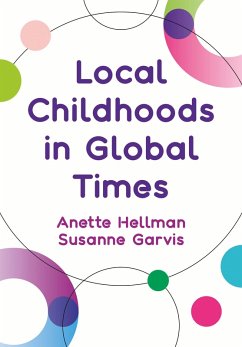This book presents different perspectives of childhood. With contributors from across the globe there are examples of local childhoods from different national contexts including America, Australia, Finland, Hong-Kong, Indonesia, Japan, Norway and Sweden.
Each chapter presents a different focus on early childhood showing the diversity and complexity across multiple countries. Issues emerge around multi-language development, nationalism and multiculturalism. Across the chapters, concepts around cultural theories of every-day life also show the ways in which practices of and in relation to children function to produce childhood as an artefact, fiction and instrument.
It helps readers to develop an understanding of how changing perspectives on children and childhood and identity are expressed among children, families and educators in and outside educational environments. It brings together active researchers in the field of global childhoods to sustain and develop our community of research and scholarship, promoting internationalization through global childhoods as a way of cultural diversity and acceptance.
The book reflects on early childhood before and leading up to Covid-19. The editors were able to create a historical snapshot of early childhood pre-Covid from several countries. The pandemic has demanded major changes around learning, agency, voice and lived experience for children around the world. In some countries there are children in lockdown, without access to learning and who have ceased to be recognised as a child. In other countries life has continued with social distancing and masks in educational spaces.
It will be a useful resource for students and academics in early childhood education and education studies more generally, as well as practitioners and educators.
Each chapter presents a different focus on early childhood showing the diversity and complexity across multiple countries. Issues emerge around multi-language development, nationalism and multiculturalism. Across the chapters, concepts around cultural theories of every-day life also show the ways in which practices of and in relation to children function to produce childhood as an artefact, fiction and instrument.
It helps readers to develop an understanding of how changing perspectives on children and childhood and identity are expressed among children, families and educators in and outside educational environments. It brings together active researchers in the field of global childhoods to sustain and develop our community of research and scholarship, promoting internationalization through global childhoods as a way of cultural diversity and acceptance.
The book reflects on early childhood before and leading up to Covid-19. The editors were able to create a historical snapshot of early childhood pre-Covid from several countries. The pandemic has demanded major changes around learning, agency, voice and lived experience for children around the world. In some countries there are children in lockdown, without access to learning and who have ceased to be recognised as a child. In other countries life has continued with social distancing and masks in educational spaces.
It will be a useful resource for students and academics in early childhood education and education studies more generally, as well as practitioners and educators.
Dieser Download kann aus rechtlichen Gründen nur mit Rechnungsadresse in A, D ausgeliefert werden.


